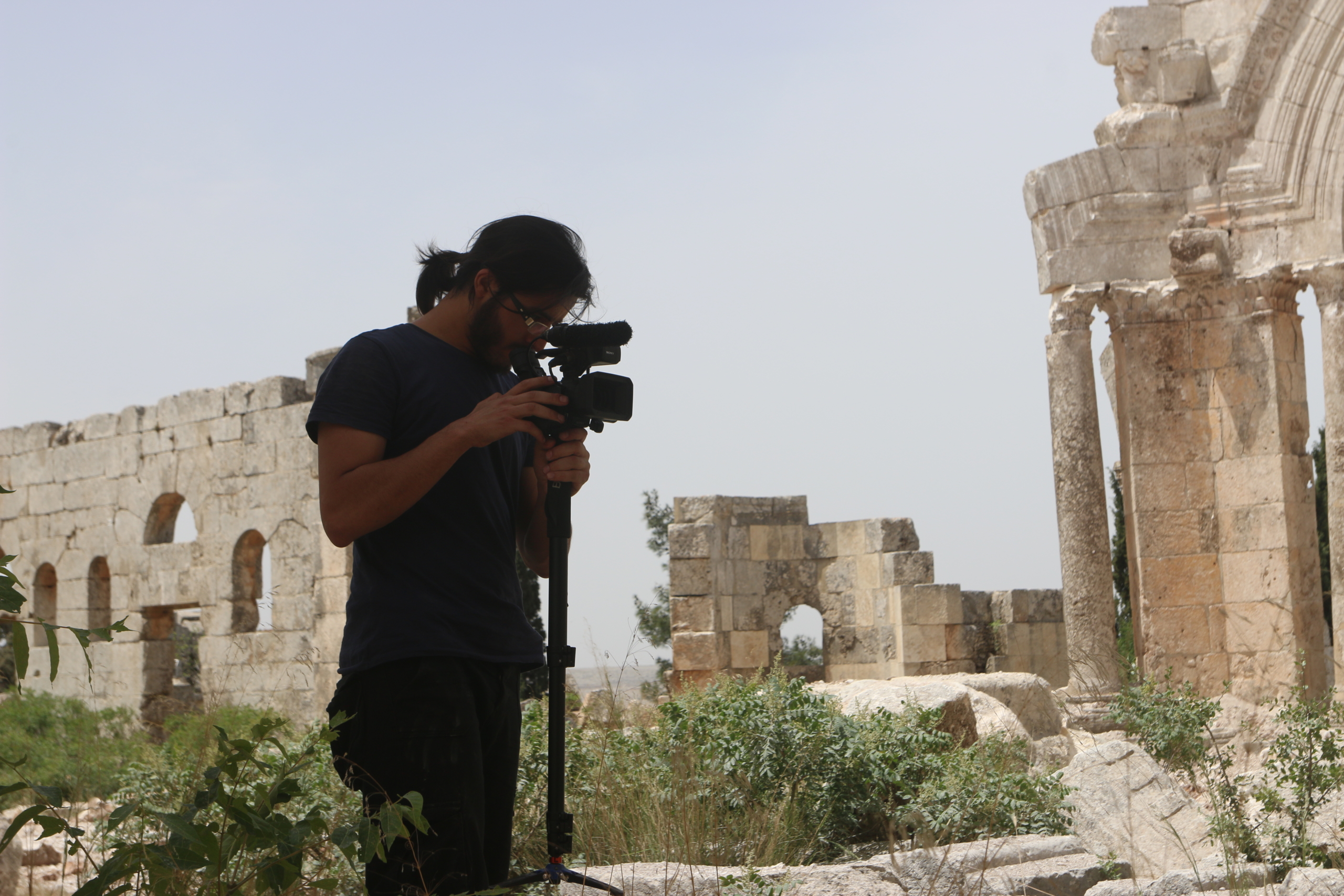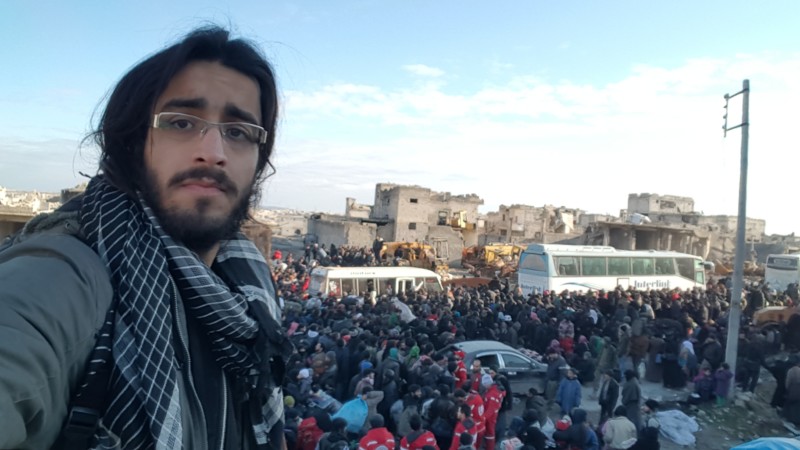Sign up for the daily CJR newsletter.
When Hussein Akoush woke to the sound of a rocket landing near his house in Aleppo in 2014, he ran outside to find a scene of horrific carnage. A vegetable market had been hit; at least 42 civilians were killed, and dozens injured. “There were charred bodies all over the ground. All around me I could hear people moaning and screaming,” he remembers. “That [scene] had an impact on me, and pushed me to take action.”
That same year, Akoush began his journalistic career, first as a media activist and later as a professional journalist, trying to document the horrors of a war many foreign reporters couldn’t fully access. But like many others, he hadn’t planned on being a reporter. He was dragged into it by the war—and by the reality that Syrian residents had become the sole witnesses to the alleged war crimes and atrocities devastating their country, since the Syrian government gave little to no access to foreign reporters on the ground. Many citizen journalism initiatives started sprouting over Syria in 2011 when the uprising began, and until the outbreak of the war. Some are still active today and have even received international recognition for their work—Raqqa is being slaughtered silently and Enab Baladi are among the most famous.
ICYMI: CNN frustrates viewers with gun comment controversy
Since the outbreak of the war, inflation as well as unemployment rates in Syria skyrocketed, from 8.4 percent to 14.9 percent the year the war began, and a steady 14.3 percent throughout the years of conflict. According to a Mercy Corps report, many young Syrians both inside the country and in neighboring territories feel trapped and frustrated by the meager job prospects. They usually don’t find employment opportunities that meet their qualifications and previous training. Forced or motivated by these circumstances, many young citizens turned to journalism, and news agencies like AFP, Reuters, and Anadolu Ajansi have been integrating non-professional photographers and videographers into their teams since the outbreak of the war. Many took up a camera or a pen for the first time after they had already been on the ground, and some came from scientific and engineering backgrounds—the most common academic paths for Syrian youth.
Before the start of the conflict, Akoush was studying dentistry at Aleppo University. “It was my childhood dream to become a dentist, but after just one semester I was forced to stop going to university, due to the ongoing war,” he says. He began volunteering in local medical facilities. It was there, witnessing the horrors of war, that the idea of a different career path solidified in his mind.
“I became interested in journalism due to the absence of objectivity and professionalism in Syria’s media outlets,” he says. “After the rocket attack near my home, which had been only superficially reported, I knew that documenting the truth was what I wanted to do with my life.” He started working with international correspondents, both on the ground in Syria and from abroad, working mostly as fixer or assistant reporter. He then began his independent freelance work for foreign papers and TVs once he moved to Gaziantep, a city in Southeastern Turkey two hours away from Aleppo, and a major hotspot of the refugee crisis.
In Gaziantep, he met many displaced Syrian reporters in similar situations, including Zouhir Al-Shimale. Al-Shimale, who lived in Eastern Aleppo until the December 2016 evacuation, had started his own form of media activism in late 2015 while studying law at university.
He began by posting pictures and video clips on social media of rocket attacks and citizen evacuations, but he soon realized he wanted to do more. “There were not many people in the field who could speak English well enough,” he says, “so I felt an obligation [to pursue this career] even though I didn’t have any journalism background.”. His work gradually evolved into a career, thanks to steady stringer gigs for Al Jazeera English and Middle East Eye. Al-Shimale adds that many of his friends have become journalists since the outbreak of the war in Syria because there are “too many things in every corner there that need visibility.”
ICYMI: What journalists are saying about Anderson Cooper’s interview with Stormy Daniels
Even for Mahmoud Alhaji Othman, a 31-year-old refugee from Aleppo, journalism was more a wakeup call than a premeditated choice. “[Before the war] I loved taking photos and using the camera, but I knew I was not going to be a journalist because media is controlled by the government,” he says. While an electronic engineering, then economics student, he started publishing photos and videos on social media of daily life under siege, reaching out to organizations and foreign journalists to show them the reality on the ground. “I didn’t plan to be a journalist,” he says, “but someone had to do it.”
In 2011, he began working for Basma, another Syrian citizen journalism platform; then, encouraged by foreign correspondents on the field who were giving him professional advice, he became a cameraman for Al Jazeera Arabic, a photographer for Reuters, and a correspondent for Anadolu Ajansi. “I started as a citizen journalist and wasn’t thinking of going beyond that,” he says. “I didn’t know the revolution would transform into a war and take so long; I was just interested in media activism to help my people and show the world what was happening.” After a few years as a freelance journalist, he decided to get a formal education. Now with a granted asylum status in Orléans, he’s learning French for a journalism master’s program he’ll soon be starting at Paris Dauphine University in France.
Loubna Mrie, a photographer and civil rights activist from Latakia who is now based in New York City, is one of the most famous female journalists from Syria. In early 2012, there weren’t many journalists covering the protests in the country because the government wasn’t allowing access, she explains: “So it was our mission, the people who were part of this uprising, who spoke English and were able to take photos, to become journalists. Although we didn’t call ourselves journalists; we weren’t really looking for that title, but just for a way to get the word out, to show what was going on in Syria.”
Until 2014, Mrie specialized in photography for Reuters; however, seeing her access to sources and brave reporting, publishers and correspondents started reaching out to her to write in English. “[At that time] I didn’t really know how to write, so the journalists who reached out to collaborate with me taught me how to write journalistic pieces, how to quote people and ask questions,” she says. “I learnt more [on the field] than in a journalism school.”
Thanks to that encouragement, she realized she wanted to write more, in addition to working toward her dream of becoming a photo editor after she received a diploma from the International Center of Photography. “Even though I make, and keep making, many mistakes because I didn’t study journalism, my professors and editors were always there to teach me all the rules,” Mrie says.
“I [entered] this profession because, otherwise, I’d feel guilty to have access to this part of the world, having the chance to speak with these people on a daily basis, and not getting the word out about their suffering,” she continues. “I’m deeply convinced journalism should be about the people, not personal gains.”
At the beginning of the war, she says, many citizen journalists were not supported by any organizations and didn’t ask for remuneration. “Later on, news agencies started paying for those reports, and people would of course accept” in a country ravaged by war, where financial strains were constantly growing. “Those in need of money would mostly be fixers, especially in Lebanon, Jordan, and Turkey, where it would be an easy gig for them,” she adds, particularly because that work is one of the most accessible income opportunities for displaced Syrians.
For fixer Ossama Muhammad, when the operation to retake Raqqa began in 2017 and foreign journalists poured into his region, it was the right moment for a career change, after working for over a year in humanitarian aid. “I wanted to change my job and that was a good time, since a lot of journalists wanted to come to cover the battle,” he says. Muhammad went back to NGO work at the beginning of this year, but his experience made it all too clear that he was not the only one in economic need.
The work of Syrian citizen journalists has been inspirational for a new generation. Cyrille Kebbé is one of the few Syrian refugees to have been granted asylum in France. Today, she studies biomedical sciences at the Institut Catholique in Paris, where she moved in August 2016. “I was pushed by my parents, who are both dentists, to undertake a scientific academic path, as that’s the most common social expectation from Arab parents in Middle Eastern societies,” she says. “But since the outbreak of the war, I’ve been inspired to write about the truth about Syria, and contribute to this cause.” Kebbé decided to finish her undergraduate studies in English so she would have the language basis to begin a master’s program in journalism, despite the common notion in the Arab world that it’s not a socially appropriate profession, especially for women. However, having seen the efforts of citizen activists who successfully began new careers, this profession seems to be gradually receiving recognition by locals, who now understand the value of being able to tell their own narratives to the rest of the world.
TRENDING: A newspaper’s baffling column on the term ‘racist’
Has America ever needed a media defender more than now? Help us by joining CJR today.








